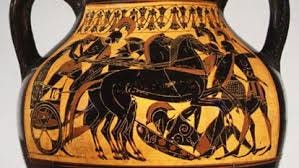
Something different. Michael Longley was born in Belfast and is 81 later this month. He was a Classical scholar at Trinity College, Dublin, which is of interest to me as I studied Classics also. Michael frequently brings classical references into his poetry. As here, in Michael’s poem, The Horses:
For all of the horses butchered on the battlefield,
Shell-shocked, tripping over their own intestines,
Drowning in the mud, the best war memorial
Is in Homer: two horses that refuse to budge
Despite threats and sweet-talk and the whistling whip,
Immovable as a tombstone, their heads drooping
In front of the streamlined motionless chariot,
Hot tears spilling from their eyelids onto the ground
Because they are still in mourning for Patroclus
Their charioteer, their shiny manes bedraggled
Under the yoke pads on either side of the yoke.
Thousands of innocent horses must have been killed on battlefields down the centuries, yet this poet, Michael Longley, chooses to commemorate them all by two immortal horses, Balius and Xanthus, the horses that pulled the chariot of the god-like Achilles. And who can blame Michael? For nowhere else in literature are two horses depicted as weeping in sorrow for the death of their master.
We are on the plains in front of the city of Troy, roughly three thousand years ago, witnessing bloody deeds and extraordinary bravery, described in detail in the first of Homer’s two epic poems, The Iliad and The Odyssey. All against a backdrop of a pantheon of gods pulling the strings and deciding who gets to kill and who gets to be killed. Homer’s The Iliad (after Ilion, the ancient name of Troy), like all good epics, tells stories that magnify behaviours, good and bad, and draws our attention to the inevitability of destiny. So, although men seem to be the playthings of the gods’ whims, they are in fact playing out their fates.
Achilles has been sulking in his tent for years as the siege of Troy drags on. His friend and mentor, Patroclus, seeks to break the deadlock and persuades Achilles to loan him his armour and his chariot, drawn by Balius and Xanthus. Achilles does so – on condition that Patroclus does not extend his fight beyond the beached Greek ships. We already sense disaster when Patroclus, so excited by his success in the battle, forays beyond the ships. He is soon murdered by Euphorbus and Hector. The latter Trojan strips Patroclus of the borrowed armour and his (Hector’s) fate is now sealed. This is the turning point of the whole war. From here on, it is only downhill for the Trojans. Achilles loved Patroclus, but his anger at his friend’s death was nothing compared to the insult of the Trojan Hector wearing his armour. Achilles in his revenge goes out and kills Hector, son of Priam, King of Troy, and defiles his body in the dirt. The stuffing is knocked out of the Trojans. The end approaches.
Patroclus was greatly loved by Achilles’s horses, Balius and Xanthus. These two steeds were godlike, born from a Harpy and Zephyr, the West wind. As soon as they learn of Patroclus’s death, they come to a halt amid the battle and begin to weep. Has ever a slain warrior been so touchingly mourned? (I can think one, also remembered in a poem which I will bring to your notice presently). Homer says how they stand still as pillars planted over the tombs of the dead, their heads bowed down to the dust, and hot tears pour from their eyes.
Zeus witnesses the anguish of the horses and apologises for involving them in man’s futile and ugly escapades, the miseries of mortal existence. ‘For what is there more miserable than man, among all the things that move and breathe on earth?’ Zeus is not contemptuous of man here, rather is acknowledging that man can and does cause misery for himself.
This line is crucial in the whole epic. The contrast between divinity and humanity is stark. The audience would have been men, women, and children, the very people Zeus has just described as the most miserable on earth. These people were simple folk, sitting around campfires or in amphitheatres and engrossed as they listened to the storytellers whose recital of these poems was one of their few entertainments available. The stories are epics, capturing the expression on a massive scale of the triumphs and the frustrations of human life. Almost three thousand years ago, men were even then entertained by stories of heroism and homicide – and the lessons from the behaviour of the protagonists.
Imagine going to bed that night with the words of the chief god (Zeus) ringing in one’s ears – ‘nothing is more wretched than man’!


